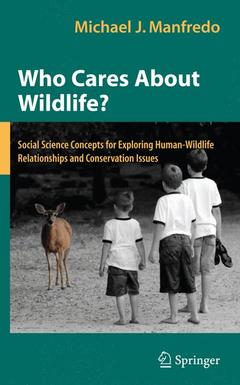Description
Who Cares About Wildlife?, 2008
Social Science Concepts for Exploring Human-Wildlife Relationships and Conservation Issues
Language: French
Subjects for Who Cares About Wildlife?:
Description
/li>Contents
/li>Comment
/li>
Who Cares About Wildlife? integrates social science theory in order to provide a conceptual structure for understanding and studying human interaction with wildlife. A thorough review of the current literature in conceptual areas, including norms, values, attitudes, emotions, wildlife value orientations, cultural change, and evolutionary forces/inherited tendencies is provided, and the importance of these areas in studying human-wildlife relationships is highlighted.
No other book both considers the human relationship with wildlife and provides a theoretical framework for understanding this relationship on the individual, as well as cultural level. Who Cares About Wildlife? will be valuable both to students and to practitioners in wildlife management and conservation, as well those interested in the human relationship with wildlife, natural resources, and the environment.




